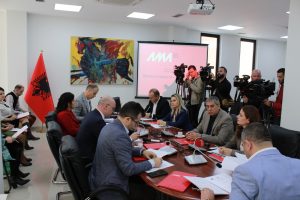
On Wednesday, November 14, 2018, the Audiovisual Media Authority (AMA) and the Complaints Committee organized a round table on “hate speech” in audiovisual media.
The purpose of this round table was to scan the situation. Through their presentations, the researchers and experts of the field shared their analytical views about hate speech in audiovisual media. This topic has been a matter of discussion in many forums.
Lecturers from Journalism and Communication Department at the University of Tirana, members of the Parliamentary Committee on Education and Media, representatives of the State Agency for the Rights and Protection of Children, televisions, international organizations, etc., were part of this round table.
In his welcome speech, the AMA’s Chairman, Mr. Gentian Sala, stressed that “hate speech” is a phenomenon discussed every day, in the light of technological developments. “Nowadays, we are discussing more and more about the relationship between hate speech and the law, the media laws, the media itself, internet, and the thousands social networks. For this reason, the European Parliament has recently amended the Audiovisual Media Services Directive. An important aspect of this Directive are video-sharing services, social media, and user-generated videos, because they evidently have “a significant impact and facilitate the ability of users to shape or influence the opinion of other users”, – stressed Mr. Sala.
The Chairman of AMA’s Complaints Committee, Mr. Urim Bajrami, after explaining the reasons why this initiative to discuss hate speech was undertaken, underlined the need for cooperation among all stakeholders and factors of this field, in order to identify the problems, in particular, those that are related to the television content and implementation of legal and ethical norms, and to come up with some solutions for improving the situation.
Mr. Alban Tartari, while talking about hate speech on regional and ethnic grounds in audiovisual media, drew the attention to the fact that editorial policies often aim to reach a high visibility and view clicks at online television websites, and this policy is biased on negative news and their amplification. According to him, ethical, certified and consolidated boards are needed to prevent such episodes and to take sanctions in case of violations in audiovisual media. At the same time, he added, we need a greater awareness of journalists, editors, directors and all producers about radio and television content.
The MP of Albanian Parliament, member of Education and Public Information Means Committee, Mrs. Almira Xhembulla, said that it was always a pleasure for her to be among professionals and to be part of such a high-quality round table. Mrs. Xhembulla admitted the weak points of discussion and of the works of Parliament pointing out the adherence to ethics by MPs of Albanian Parliament. She said that hate speech problems should be addressed without delay, before they would become a daily phenomenon in our media.
Mr. Erlis Çela, on the other hand, discussed hate speech from another perspective, as he presented his study on news stories and adding that such news promotes stereotyping and hate among audiences. Despite the space that news section covers in the information transmitted by audiovisual media, the most important aspect, for him, remain the language used in the news of this nature. “Technological developments, besides sacrificing some of the journalistic deontological and professional principles, have increased the competition pressure for latest news,” stressed Çela.
Mrs. Laureta Axhami Zela focused on the role of journalists in preventing hate speech in audiovisual media. She presented also the findings of a survey carried out into the audiovisual media journalists and editors’ knowledge about hate speech.
Mr. Bashkim Gjergji, in turn, discussed the nature and extent of hate speech nowadays. According to him, when the tradition speaks about religious harmony in our country, about the protection of Jews during the World War II, for the absence of aggressive acts and violence against other peoples, the term “hate speech, in this case, does not coincide with the meaning given by social sciences based on historical facts and the several clashes from antiquity up to date.
Then, Mrs. Suela Musta focused her presentation on gender stereotypes on local televisions and the challenges of dealing with the Broadcasting Code. While referring to some examples brought by Vlora and Shkodra, she added that “gender stereotypes are among the most frequent violations of information and communication ethics in the media, while TV still has the supremacy of public information and education”.
When discussing about the inclusive reality for all types of current media, the collapse of former editorial hierarchy or the new forms of internal communication in media institutions, hate speech, its format and use, have become, for Mr. Ramadan Çipuri, a media expert, an indivisible part of the TV offer, which is thought to have a strict control before it is broadcast to the audiences.
In conclusion of this round table, Mr. Sami Nezaj, Deputy Chairperson of AMA, made a short summary of all presentations and suggestions.
Audiovisual Media Authority
Tirana, on November 14, 2018

